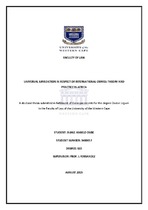Universal jurisdiction in respect of international crimes : theory and practice in Africa
Abstract
The crimes of genocide, war crimes and crimes against humanity are customary international law crimes. The African continent has experienced quite a number of cases involving these crimes, and the continent's ability and willingness to prosecute offenders’ remains in doubt. As a result, in the past decade or so, non-African states have sought to institute proceedings against African leaders accused of perpetrating international customary law crimes. These attempts have taken two distinct formats, the first being the use of Universal Jurisdiction {UJ), and the second being the attempts by the International Criminal Court {ICC) to indict and prosecute African leaders. The African Union {AU) has vehemently opposed both these attempts on the grounds that they are inspired by neo-colonial thinking that is aimed at stifling peace and reconciliation efforts on the continent.Proponents of UJ argue that this principle is fundamental to international justice and the global fight to end impunity for international crimes. UJ allows a state to exercise jurisdiction over crimes committed outside its territory and for which the normal jurisdictional links of nationality and passive personality do not exist. Although the concept of UJ has been part of international law for quite some time, its relevance today has been questioned by national courts and international judicial bodies. Its recent usage by both Belgian and French courts, as well as by international tribunals, such as the ICC, has attracted sharp criticism from many African states. Given that African states constitute the biggest block of signatory states to the Rome Statute, their voice cannot be ignored. Their principal concern is that the ICC is unfairly targeting African leaders for prosecution. The negative sentiment is also evidenced by some African leaders' deliberate refusal to comply with ICC requests or to cooperate in cases where warrants of arrest have been issued against African leaders, such as in the case of the Sudanese President, Omar Al Bashir, and the present prosecution of the Kenyan President, Uhuru Kenyatta and his deputy, William Ruto. Given the aversion shown by African states to ICC prosecution of state leaders, and attempts by some non-African states to resort to UJ in order to try African leaders, the question is whether African states themselves have a solution to the problem of impunity on the continent? The answer might lie, partly, in the age old concept of UJ, where individual African states might be able to exercise jurisdiction over the international crimes of genocide, war crimes and crimes against humanity. It might also lie in the ability and willingness of African states to strengthen the Continent’s own, regional institutions by setting up an African international criminal tribunal, or strengthening an existing one to deal with these issues. It therefore becomes important to assess what the African standpoint on UJ is, as against what the practical realities are. In other words, what continental or regional institutions exist to combat impunity for international crimes: what do states do in fact?

